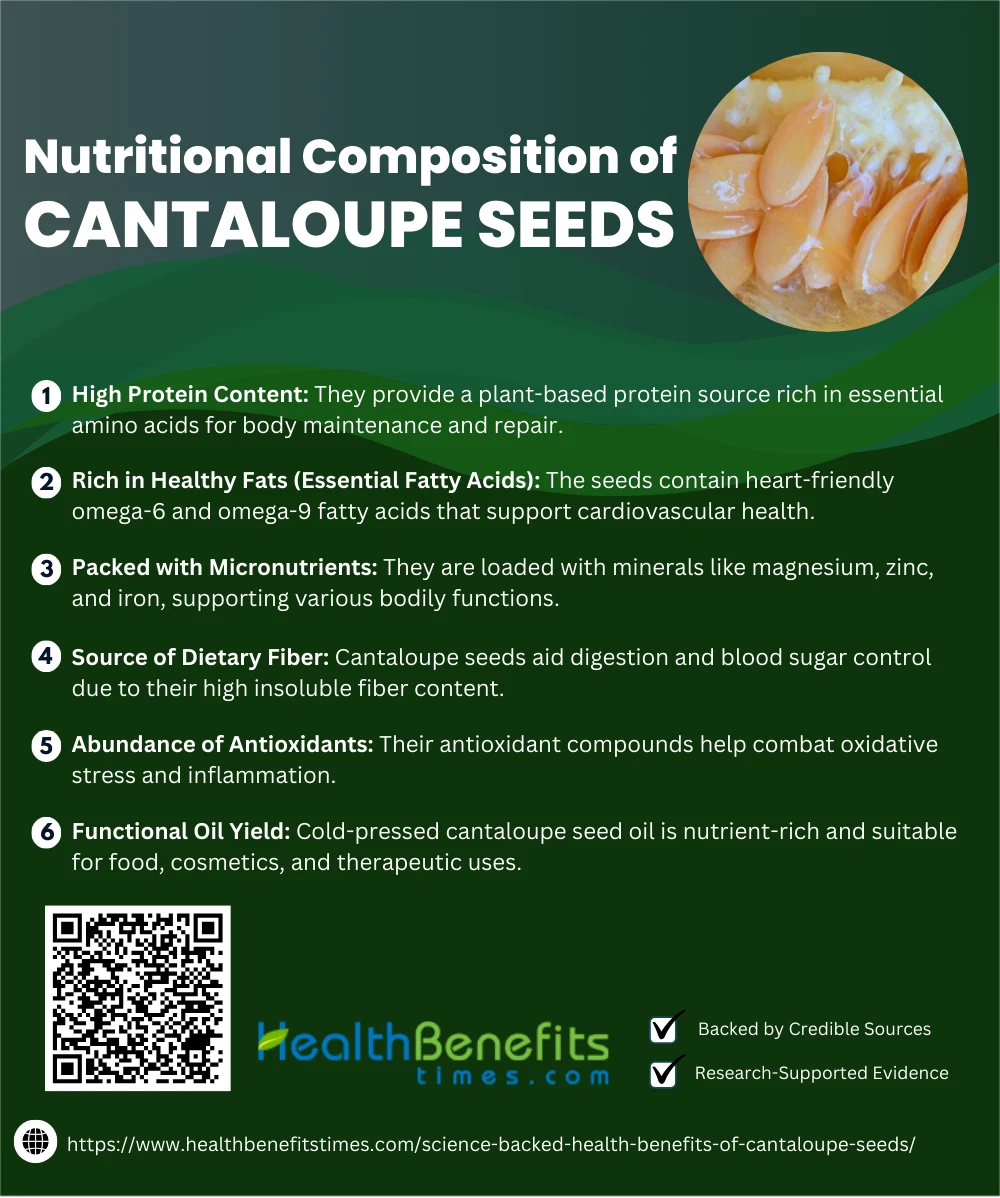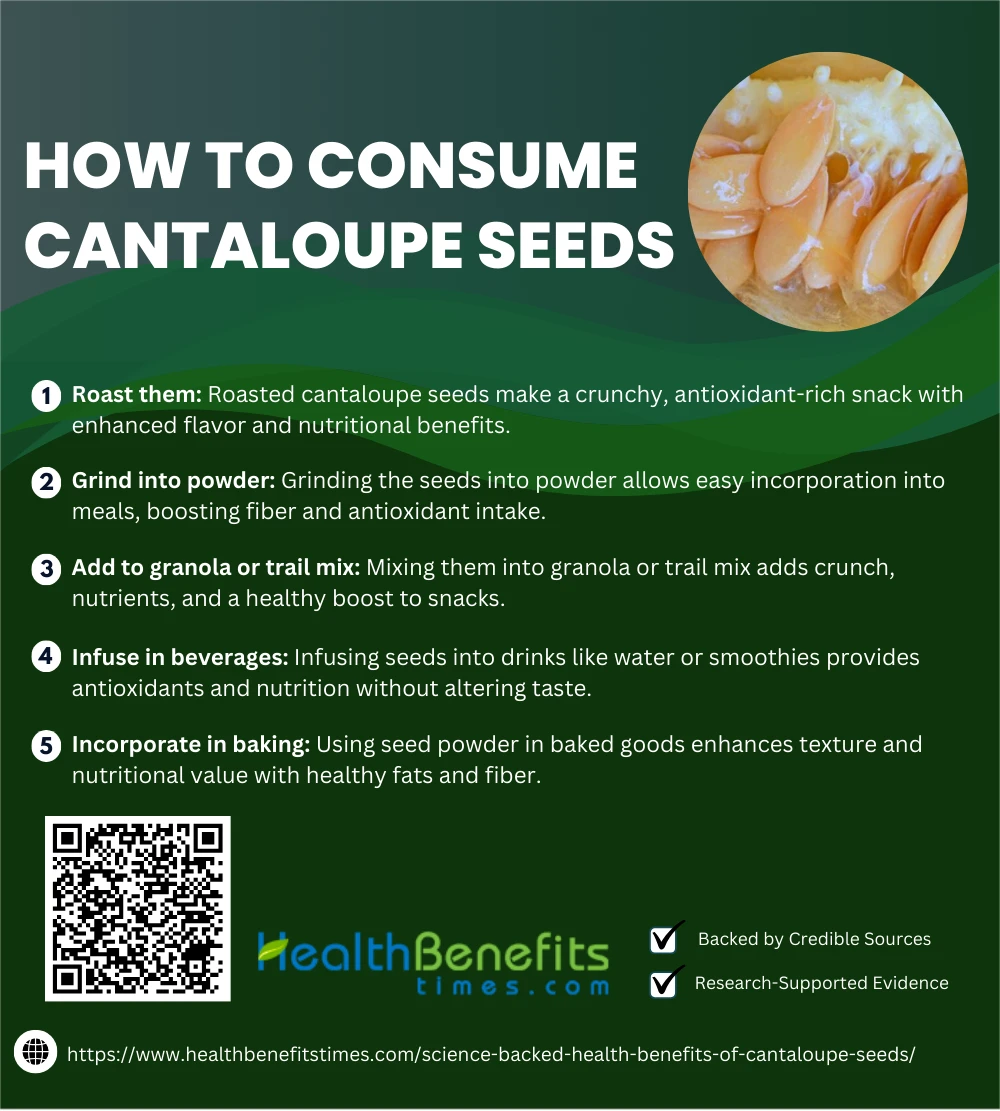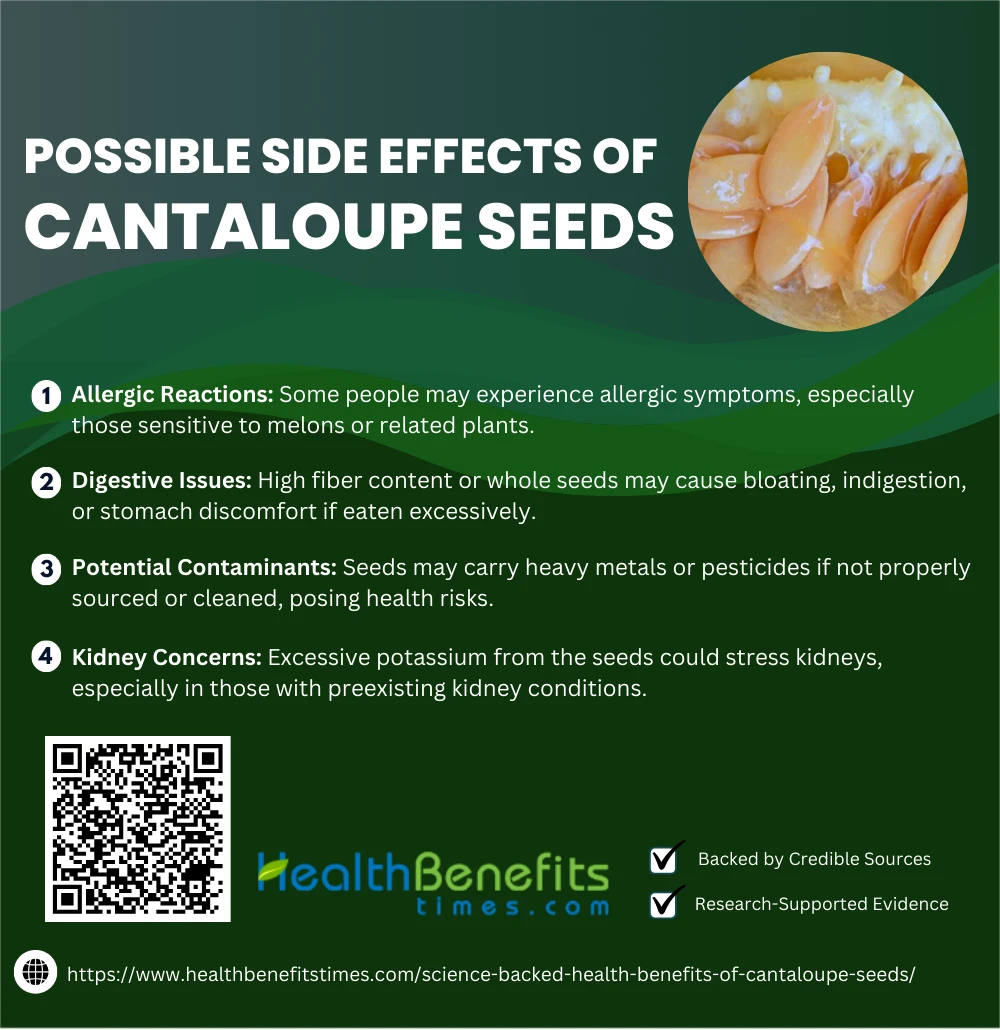- Cantaloupe seeds are the edible seeds found inside the cantaloupe melon, packed with essential nutrients and bioactive compounds.
- These seeds are rich in healthy fats, proteins, fiber, and antioxidants that support various aspects of health, from heart health to skin care.
- Research supports their role in promoting digestive health, boosting immunity, and offering anti-inflammatory and anti-cancer properties.
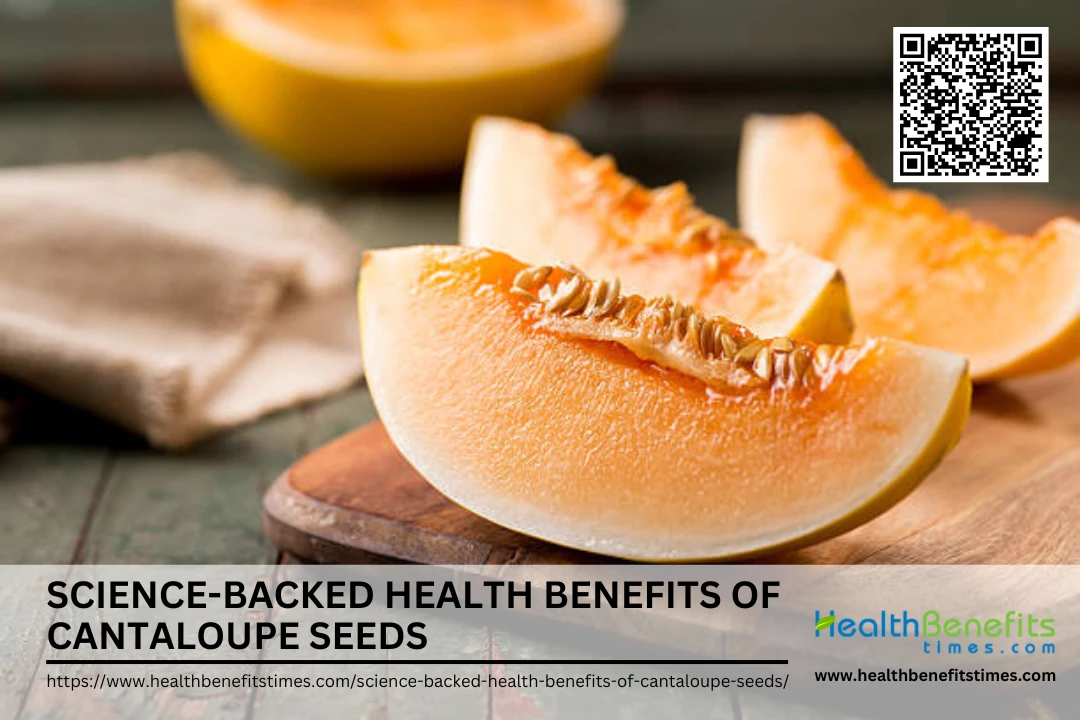 Cantaloupe seeds are the edible seeds of the Cucumis melo fruit, commonly known as cantaloupe or muskmelon, and are increasingly recognized for their high nutritional and medicinal value. Recent studies have demonstrated that cantaloupe seeds are a rich source of essential nutrients and bioactive compounds, offering a wide range of health benefits. These seeds contain high levels of protein, omega-6 and omega-9 fatty acids, dietary fiber, and micronutrients like magnesium and zinc, all of which contribute to metabolic, cardiovascular, and digestive health. Additionally, cantaloupe seed extracts exhibit notable antioxidant and antimicrobial properties, making them a promising candidate in the development of functional foods and natural therapeutics. For instance, a study highlighted the antioxidant potential and lipid-lowering effects of methanolic extracts derived from cantaloupe seeds when compared with other parts of the plant.
Cantaloupe seeds are the edible seeds of the Cucumis melo fruit, commonly known as cantaloupe or muskmelon, and are increasingly recognized for their high nutritional and medicinal value. Recent studies have demonstrated that cantaloupe seeds are a rich source of essential nutrients and bioactive compounds, offering a wide range of health benefits. These seeds contain high levels of protein, omega-6 and omega-9 fatty acids, dietary fiber, and micronutrients like magnesium and zinc, all of which contribute to metabolic, cardiovascular, and digestive health. Additionally, cantaloupe seed extracts exhibit notable antioxidant and antimicrobial properties, making them a promising candidate in the development of functional foods and natural therapeutics. For instance, a study highlighted the antioxidant potential and lipid-lowering effects of methanolic extracts derived from cantaloupe seeds when compared with other parts of the plant.
Nutritional Composition of Cantaloupe Seeds
Cantaloupe seeds are a nutrient-dense byproduct often overlooked. They contain a rich profile of proteins, healthy fats, fiber, and essential minerals, making them a valuable addition to a balanced diet.
Cantaloupe seeds are a significant plant-based source of protein, comprising up to 28–34% of their dry weight. This makes them valuable for vegetarian and vegan diets. The protein includes essential amino acids necessary for muscle maintenance, immune function, and cellular repair. Study on melon seed protein highlights their potential in protein-enriched food formulations. (1)
2. Rich in Healthy Fats (Essential Fatty Acids)
These seeds are abundant in unsaturated fats, particularly omega-6 (linoleic acid) and omega-9 (oleic acid). These fatty acids are crucial for cardiovascular health, aiding in cholesterol management and inflammation reduction. The lipid profile is comparable to that of sunflower or pumpkin seeds, making them a healthy fat source. (1)
3. Packed with Micronutrients
Cantaloupe seeds offer substantial amounts of magnesium, zinc, potassium, calcium, and iron. These micronutrients support enzymatic activity, muscle function, and immune health. For instance, zinc contributes to DNA synthesis and wound healing, while magnesium regulates nerve and muscle activity. (2)
4. Source of Dietary Fiber
Cantaloupe seeds contain dietary fiber, primarily insoluble fiber, which aids digestion and promotes bowel regularity. Fiber also contributes to satiety and helps manage blood glucose levels. When ground into flour, the fiber content increases further, suggesting use in gluten-free or high-fiber diets. (2)
5. Abundance of Antioxidants
The seeds are rich in phenolic compounds and flavonoids that act as antioxidants, neutralizing free radicals and reducing oxidative stress. This property makes cantaloupe seed extracts promising for anti-aging and anti-inflammatory applications in food and pharmaceuticals. (3)
6. Functional Oil Yield
Cantaloupe seeds can be cold-pressed to extract a clear, odorless oil that retains most of their nutrients. The oil exhibits stability and a favorable fatty acid composition suitable for culinary, cosmetic, and therapeutic uses. Studies also highlight its functional properties and shelf-life benefits. (4)
Health Benefits of Cantaloupe Seeds
Cantaloupe seeds offer impressive health benefits due to their rich content of nutrients and bioactive compounds. They support heart health, digestion, immunity, and more, making them a functional food choice.
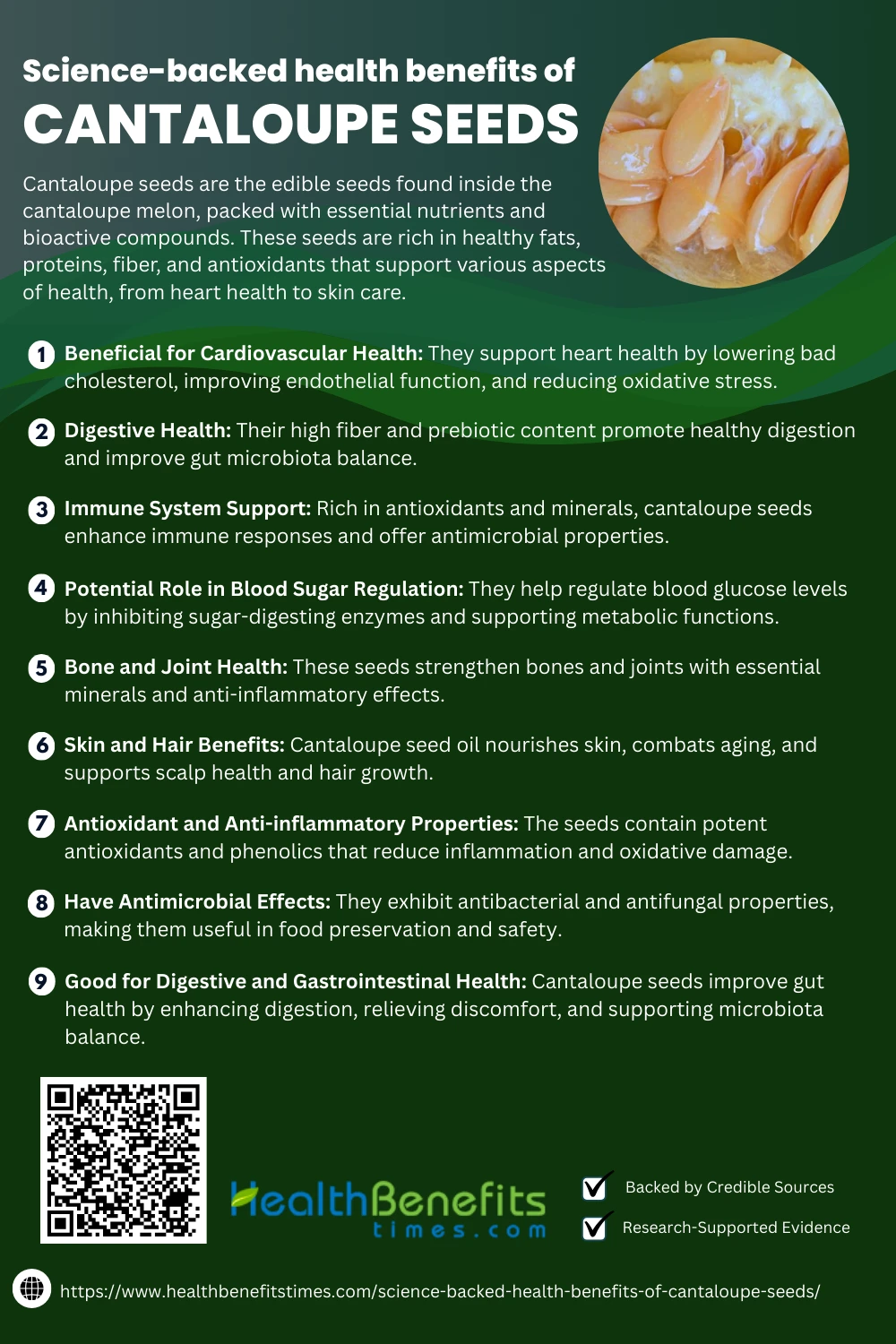 1. Beneficial for Cardiovascular Health
1. Beneficial for Cardiovascular Health
Cantaloupe seeds are increasingly recognized for their cardiovascular benefits, primarily due to their rich content of unsaturated fatty acids like linoleic acid, which help reduce LDL cholesterol and enhance heart health. (1) Their antioxidant capacity, driven by polyphenols and flavonoids, combats oxidative stress that underlies heart disease. (5) Additionally, magnesium and potassium in these seeds support blood pressure regulation. Seed extracts also enhance endothelial function and demonstrate lipid-lowering effects in animal models. (6)
2. Digestive Health
Cantaloupe seeds contribute to digestive well-being through their high fiber content, which enhances gut motility and alleviates constipation (Chawla & Bains, 2020). Their seed flour promotes mineral bioavailability and digestive enzyme support. (1) Additionally, fermented beverages containing cantaloupe improved microbial balance and antioxidant action in the gut. (7) Their prebiotic potential has also been identified in melon residue studies (Rolim et al., 2018). Lastly, digestive enzyme inhibition properties were found under various processing conditions. (8)
3. Immune System Support
Cantaloupe seeds provide essential nutrients and bioactive compounds that help bolster the immune system. Their high levels of antioxidants, such as polyphenols and carotenoids, strengthen immune defenses against oxidative damage. (9) These seeds also contain zinc and magnesium, which support immune cell signaling. Additional studies show their antimicrobial peptides enhance innate immunity. (10) Fermented forms may also improve gut-mediated immune regulation. Lastly, bioactive lipid extracts from the seeds have shown immunomodulatory potential in vitro. (11)
4. Potential role in Blood Sugar Regulation
Cantaloupe seeds are gaining attention for their potential in blood sugar regulation. Studies have shown that melon seeds may effectively lower blood glucose levels, making them a promising option for managing diabetes. For example, research indicates that compounds in melon seeds can inhibit alpha-amylase activity, which helps regulate blood sugar. (9) Additionally, their bioactive compounds, including fatty acids, are believed to play a key role in managing blood glucose in type 2 diabetes. (12) Furthermore, studies have demonstrated that melon seed extracts possess antioxidant properties that support better metabolic functions related to blood sugar control. (13) Additionally, research on bitter melon (a relative of cantaloupe) supports its antidiabetic properties. (14)
5. Bone and Joint Health
Cantaloupe seeds support bone and joint health by offering vital minerals such as magnesium, phosphorus, calcium, and zinc, all of which are essential for bone mineralization and joint integrity. Magnesium, in particular, synergizes with phosphorus to strengthen bones. These seeds also enhance collagen formation, crucial for joint flexibility. Their anti-inflammatory compounds help reduce joint inflammation. Additionally, antioxidant properties protect bones from oxidative stress-related degeneration. (15)
6. Skin and Hair Benefits
Cantaloupe seeds are not only beneficial for internal health but also provide significant benefits for skin and hair care. The oil extracted from these seeds is rich in fatty acids, which help nourish the skin and promote a healthy glow. (16) It has been shown that the antioxidant properties of cantaloupe seeds protect the skin from free radical damage and premature aging. (17) These seeds are also used in cosmetic formulations to hydrate and soothe the skin. (18) Regular application of cantaloupe seed oil can improve hair strength and promote hair growth by improving scalp health. (19) Furthermore, these seeds are used to prevent hair follicle clogging and reduce hair loss. (20)
7. Antioxidant and Anti-inflammatory Properties
Cantaloupe seeds are rich in polyphenolic compounds, which contribute significantly to their antioxidant and anti-inflammatory properties. Studies have shown that extracts from these seeds demonstrate powerful DPPH radical scavenging activity, helping to neutralize free radicals and reduce oxidative stress. (21) Additionally, the anti-inflammatory effects of cantaloupe seeds have been attributed to their high levels of phenolic compounds, which help in reducing inflammation. (11) This makes cantaloupe seeds a valuable natural remedy for inflammatory conditions. (22) Furthermore, the presence of flavonoids in these seeds enhances their antioxidant capacity, improving overall health. (23) As such, cantaloupe seeds can be a key ingredient in promoting well-being through their natural anti-inflammatory and antioxidant actions. (24)
8. Have Antimicrobial Effects
Cantaloupe seeds exhibit promising antimicrobial properties, which make them valuable in food safety and preservation. The oil extracted from these seeds has demonstrated strong antibacterial activity against pathogens such as Salmonella and Escherichia coli. (25) These antimicrobial effects are linked to the phenolic and flavonoid content present in the seeds. (23) Moreover, cantaloupe seed extracts have shown efficacy against fungal infections, demonstrating their broad-spectrum antimicrobial capabilities. (26) Studies have also confirmed that cantaloupe seeds, like other Cucurbitaceae seeds, can be effective in reducing microbial growth in various food products. (27) Their antimicrobial properties further support their potential as a natural preservative.
9. Good for Digestive and Gastrointestinal Health
Cantaloupe seeds offer significant benefits for digestive and gastrointestinal health. They are rich in fiber, which aids in digestion and helps prevent constipation by enhancing gut motility. (28) Moreover, they are packed with antioxidants and bioactive compounds that promote the health of the gastrointestinal tract. Studies show that cantaloupe seeds can be useful for balancing gut microbiota, promoting better digestion, and alleviating intestinal discomfort. Additionally, they have shown prebiotic effects that support a healthy bowel environment. (29) These benefits contribute to the growing recognition of cantaloupe seeds as functional foods for gut health. (30)
How to Consume Cantaloupe Seeds
Cantaloupe seeds can be easily incorporated into your diet through various methods. Roasting, grinding, or extracting oil are popular ways to enhance their nutritional value and enjoy their health benefits.
Roasting cantaloupe seeds is an effective way to enjoy their nutritional benefits. When roasted, the seeds develop a crunchy texture and intensified flavor, making them a tasty snack. Research shows that roasting enhances the oil absorption capacity of melon seeds, which can be utilized in various culinary applications. (31) Additionally, roasted melon seeds are popular in many cultures as a nutritious snack. (32) Studies have highlighted that roasting melon seeds contributes to their nutritional value by increasing antioxidant content. (1)
2. Grind into powder
Grinding cantaloupe seeds into powder is a versatile way to use them. The powdered form can be added to smoothies, baked goods, or even used as a supplement in various dishes. Research indicates that ground cantaloupe seeds are rich in bioactive compounds, making them a valuable ingredient in functional foods. (33) Additionally, grinding the seeds allows for better incorporation of their nutrients, offering a natural source of fiber and antioxidants. (34) The powder form of melon seeds is also considered a sustainable use of food waste by utilizing the typically discarded seeds. (35)
3. Add to granola or trail mix
Adding cantaloupe seeds to granola or trail mix is a great way to enhance the nutritional content of your snack. These seeds provide a good source of fiber, healthy fats, and essential minerals. Studies have shown that incorporating seeds like cantaloupe into foods like granola can boost both the taste and the health benefits. (36) Their versatility makes them ideal for blending with other healthy ingredients like dried fruits and nuts in trail mixes. Such additions can significantly improve the nutrient density of everyday snacks. (37)
4. Infuse in beverages
Infusing cantaloupe seeds in beverages is a great way to extract their nutrients without altering the flavor of your drinks. Research suggests that melon seed-infused water or juices can provide added antioxidants, improving the overall health benefits of your beverages. (38) Additionally, melon seeds can be used in smoothies, where they blend easily and contribute to the drink’s texture and nutritional value. (39) Using melon seeds in beverages like detox water or fruit-infused teas also offers a sustainable way to make use of the whole fruit.
5. Incorporate in baking
Incorporating cantaloupe seeds into baking is a great way to boost the nutritional value of your baked goods. Melon seed powder can be used in cupcakes, cookies, and breads, adding fiber and healthy fats to the recipes. Research shows that the inclusion of melon seed powder enhances the texture and nutritional profile of baked products, making them more functional. (40) Additionally, the seeds can act as a sustainable ingredient in gluten-free products. Studies indicate that cantaloupe seed flour provides valuable antioxidants, contributing to better overall health when included in regular baking recipes.
Possible Side Effects of Cantaloupe Seeds
While cantaloupe seeds are generally safe, excessive consumption may cause digestive discomfort or allergic reactions in some individuals. It’s important to consume them in moderation and be mindful of any sensitivities.
Consuming cantaloupe seeds can lead to allergic reactions in some individuals, particularly those with a known allergy to melons. These reactions can range from mild symptoms like itching to severe anaphylaxis. Studies have highlighted that individuals with allergies to melon, zucchini, or cucumber (which belong to the same Cucurbitaceae family) may experience allergic responses from the seeds as well. (41) In rare cases, cross-reactivity with other foods may exacerbate the allergic symptoms.
2. Digestive Issues
Consuming cantaloupe seeds may cause digestive issues, especially in individuals with sensitive stomachs. The high fiber content in these seeds can lead to bloating, discomfort, or even constipation if consumed in excess. Furthermore, when melon seeds are consumed whole, they may be hard to digest, potentially leading to indigestion. (42) For some individuals, this could cause irritation or upset stomach due to the rough texture of the seeds. (29)
3. Potential Contaminants
Cantaloupe seeds, like other melon seeds, may carry contaminants such as heavy metals and pesticides. Studies have shown that these seeds can absorb harmful substances from the environment, including cadmium and lead, posing a potential risk to health if consumed in large quantities. (41) In addition, improper handling of cantaloupes can lead to microbial contamination of seeds. (43) Contaminants like pesticides may also be present, contributing to health risks associated with melon seed consumption. (44)
4. Kidney Concerns
In rare cases, consuming cantaloupe seeds in large quantities could contribute to kidney problems. The seeds contain high amounts of potassium, which may strain kidney function if consumed excessively, particularly for individuals with preexisting kidney conditions. Studies suggest that individuals with kidney issues should be cautious when consuming high-potassium foods, including cantaloupe seeds. (44) Furthermore, the seeds may contribute to the formation of kidney stones when consumed in excessive amounts. It’s important to moderate intake to avoid potential harm to kidney health.
Conclusion
Cantaloupe seeds are a powerhouse of essential nutrients and bioactive compounds that contribute to overall health. From supporting heart health and digestion to enhancing immunity and skin care, these seeds offer numerous benefits backed by scientific research. Rich in healthy fats, antioxidants, and minerals, they can play a valuable role in maintaining a balanced diet. However, it’s important to consume them in moderation and be mindful of individual sensitivities. Incorporating cantaloupe seeds into your diet through various preparations can promote well-being while reducing food waste, making them a sustainable and healthful addition to your nutritional routine.


